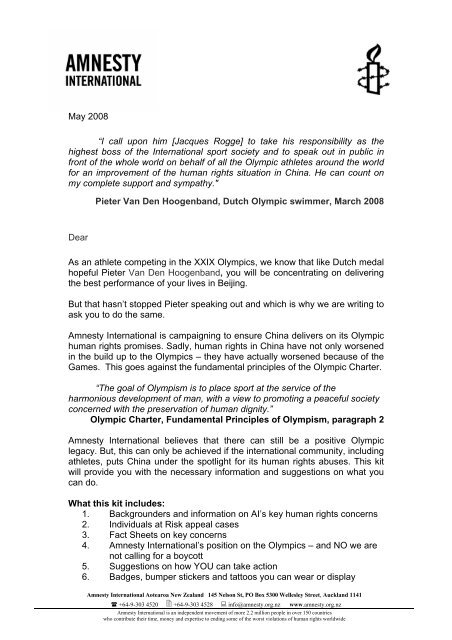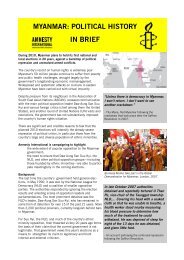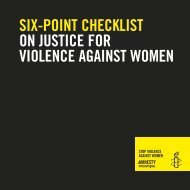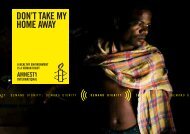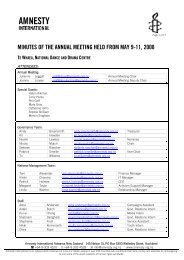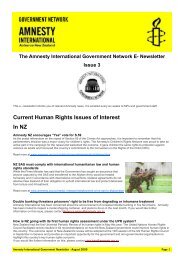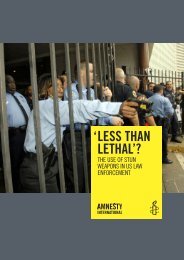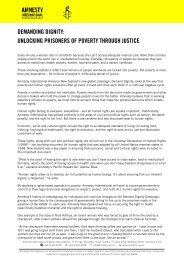Create successful ePaper yourself
Turn your PDF publications into a flip-book with our unique Google optimized e-Paper software.
May 2008“I call upon him [Jacques Rogge] to take his responsibility as thehighest boss of the <strong>International</strong> sport society and to speak out in public infront of the whole world on behalf of all the Olympic <strong>athletes</strong> around the worldfor an improvement of the human rights situation in China. He can count onmy complete support and sympathy."Pieter Van Den Hoogenband, Dutch Olympic swimmer, March 2008DearAs an athlete competing in the XXIX Olympics, we know that like Dutch medalhopeful Pieter Van Den Hoogenband, you will be concentrating on deliveringthe best performance of your lives in Beijing.But that hasn’t stopped Pieter speaking out and which is why we are writing toask you to do the same.<strong>Amnesty</strong> <strong>International</strong> is campaigning to ensure China delivers on its Olympichuman rights promises. Sadly, human rights in China have not only worsenedin the build up to the Olympics – they have actually worsened because of theGames. This goes against the fundamental principles of the Olympic Charter.“The goal of Olympism is to place sport at the service of theharmonious development of man, with a view to promoting a peaceful societyconcerned with the preservation of human dignity.”Olympic Charter, Fundamental Principles of Olympism, paragraph 2<strong>Amnesty</strong> <strong>International</strong> believes that there can still be a positive Olympiclegacy. But, this can only be achieved if the international community, including<strong>athletes</strong>, puts China under the spotlight for its human rights abuses. This <strong>kit</strong>will provide you with the necessary information and suggestions on what youcan do.What this <strong>kit</strong> includes:1. Backgrounders and information on AI’s key human rights concerns2. Individuals at Risk appeal cases3. Fact Sheets on key concerns4. <strong>Amnesty</strong> <strong>International</strong>’s position on the Olympics – and NO we arenot calling for a boycott5. Suggestions on how YOU can take action6. Badges, bumper stickers and tattoos you can wear or display<strong>Amnesty</strong> <strong>International</strong> Aotearoa New Zealand 145 Nelson St, PO Box 5300 Wellesley Street, Auckland 1141 +64-9-303 4520 +64-9-303 4528 info@amnesty.org.nz www.amnesty.org.nz<strong>Amnesty</strong> <strong>International</strong> is an independent movement of more 2.2 million people in over 150 countrieswho contribute their time, money and expertise to ending some of the worst violations of human rights worldwide
New Zealanders have never shied away from speaking out for what is right.As an Olympic athlete we would welcome you using this <strong>kit</strong> to help you do so.Please do contact me or Campaigns Assistant Asha Andersen if you have anyqueries or would like to add your voice to the global call for human rights. Ourcontact details are provided within this <strong>kit</strong>.Good luck in BeijingMargaret TaylorCampaigns ManagerAsha AndersenCampaigns Assistant
ATHLETES KIT
ContentsMessage from Irene KhanThe Challenge for China<strong>Amnesty</strong> <strong>International</strong>’s Olympic Campaign<strong>Amnesty</strong> <strong>International</strong>’s position<strong>Amnesty</strong> <strong>International</strong>’s Action AsksProminent personalities speaking outUseful resourcesResources accompanying this <strong>kit</strong>Fact Sheets:- Olympic Games and Human Rights- Death Penalty- Internet and Media Censorship- Human Rights Defenders- Detainment and Torture- Spiritual Repression- Ethnic Minorities- Free Trade Agreement8 x Individuals at Risk Case sheets and appealletters to sign and return to <strong>Amnesty</strong> <strong>International</strong>.<strong>Amnesty</strong> <strong>International</strong> is an independentworldwide movement ofpeople who campaign for internationallyrecognized human rightsto be respected and protected. Ithas more than 2.2 million membersand supporters in over 150countries and territories.Published by: <strong>Amnesty</strong> <strong>International</strong><strong>International</strong> Secretariat PeterBenenson House 1 Easton StreetLondon WC1X ODW United Kingdom© <strong>Amnesty</strong> <strong>International</strong> Publications 2008All rights reserved. This publication is copyright,but may be reproduced by any methodwithout fee for advocacy, campaigning andteaching purposes, but not for resale.The copyright holders request that all suchuse be registered with them for impact assessmentpurposes. For copying in any othercircumstances, or for re-use in other publications,or for translation or adaptation, priorwritten permission must be obtained from thepublishers, and a fee may be payable.Front cover image: Athlete hurdling overbarbed wire. An image created by AI Belgiumfor use in the Beijing Olympics campaign.©<strong>Amnesty</strong> <strong>International</strong>, all rights reservedCONTACTS:Margaret Taylor, Campaigns Manager09 303 4519021 729 373margaret.taylor@amnesty.org.nzAsha Andersen, Campaigns Assistant09 3034520asha.andersen@amnesty.org.nzPhysical Address: 145 Nelson StAucklandPostal Address: <strong>Amnesty</strong> <strong>International</strong>PO Box 5300Wellesley StreetAuckland 1141New ZealandFax number: (09) 303 4528Website:www.amnesty.org.nz
MESSAGE FROM IRENE KHANSECRETARY GENERAL, AMNESTY INTERNATIONALWhen China won the bid for the OlympicGames, the Chinese authorities made a commitmentthat the Olympics would be an opportunityto develop human rights. But, as theOlympic torch approaches China for its momentousentry into the Olympic stadium, thestage is overshadowed by grave human rightsconcerns.While some reforms have been made on the death penalty, China remainsthe world’s top executioner. Human rights activists continue to bedetained and harassed. Internet users are censored. Individuals are subjectedto detention without trial called “Re-education Through Labour”,and “Enforced Drug Rehabilitation”. Reform of these two provisions haslong been promised but now they have been extended to “clean up” Beijingahead of the Games.Despite the temporary regulations which were passed earlier this year togrant foreign journalists greater freedom to travel and report from withinChina, in practice foreign journalists are not allowed to report freely. Forexample, a BBC journalist recently travelled to a village in Shengyou,three hours south of Beijing. He was detained and questioned for severalhours by the police and removed to a nearby town. There were also renewedcrackdowns on domestic journalists whose own ability to report has been tightened.An Olympic Games characterized by serious human rights violations would bean affront to the core principles of the Olympic Charter. China has promised tomake human rights improvements. China must live up to the challenge it hasset itself to aspire to the ideals of the Olympics.The founders of the Olympic Charter envisioned the Olympics Games as beingcentred firmly on the preservation of human dignity and respect for ethical principles.The Universal Declaration of Human Rights promotes dignity for every person.China, as host of the Beijing Olympics, should honour these principles.“The goal ofOlympism is to placesport at the service ofthe harmonious developmentof man,with a view to promotinga peacefulsociety concernedwith the preservationof human dignity.”– Olympic Charter,Fundamental Principlesof Olympism,paragraph 2This is a time to be proud of the Olympic Games, but if that pride is tarnishedwith human rights violations, it is bad for China, it is bad for the Olympic Gamesand it is bad for the international community.Irene KhanLEGACY OF THE BEIJING OLYMPICSCHINA’S CHOICE
THE CHALLENGE FOR CHINAA POSTIVE LEGACY FOR THE BEIJING OLYMPICS“….Olympism seeks to create a way of life based onthe joy found in effort, the educational value ofgood example and respect for universal fundamentalethical principles.”– Olympic Charter, Fundamental Principles of Olympism,paragraph 1On 8 August 2008, the 29th Olympic Games will begin in Beijing.During their campaign to secure the 2008 Olympics, theChinese authorities declared that the human rights situationin China would improve if Beijing were chosen to host theGames. Wang Wei, Secretary General of the Beijing 2008Olympic Games Bid Committee, stated, “We are confidentthat the Games coming to China not only promotes our economybut also enhances all social conditions, including education,health and human rights," a sentiment echoed by othermembers of the Committee. Liu Qi, Mayor of Beijing, said in2001, "[The Olympic Games] will help promote all economicand social projects and will also benefit the further developmentof our human rights cause."“The human rights problems remain an issue but it ismore of a challenge and an opportunity for the OlympicMovement to make a contribution to some of itsown goals – which is to put sport at the service ofmankind everywhere and maybe bring about somechange.”– <strong>International</strong> Olympic Committee Vice President DickPound after the 2008 host city announcement. July2001, Moscow.Hosting the Olympic Games is a time-honoured traditionthat embodies the pursuit of excellence for the world’s <strong>athletes</strong>and the promotion of a peaceful society. It is an enormousresponsibility for the host nation and an immensesource of pride for the people of the chosen city. The Chineseauthorities, in their bid for the Games, made manypromises to improve their human rights record. The OlympicGames is a powerful symbol of prestige and global prominenceand with that comes global responsibility and globalexpectation.An Olympic Games that promotes the principles ofOlympism blends culture and education, and improvesthe lives and human rights of the citizens. A successfulBeijing Olympics will promote these principles and excellencein sport. It is this combination that will ensure asuccessful Games.The Chinese authorities have a unique opportunity to honourthe pledges they made to advance human rights ifawarded host nation of the 2008 Summer Olympics.China’s international human rights commitments, as wellas the spirit of Olympism which assert that “the practice ofsport is a human right,” and avow respect for “universalfundamental ethical principles,” suggest that respect forhuman rights lies at the heart of the Olympic movement.The <strong>International</strong> Olympic Committee has repeatedly madeclear its expectation that human rights in China would improveas a result of Beijing being chosen to host the Games.The <strong>International</strong> Olympic Committee has stated that it relieson international human rights organisations, including<strong>Amnesty</strong> <strong>International</strong>, to monitor and report on the humanrights situation in China and that it is committed to listeningto these organisations. If grave human rights violations arenot being sufficiently addressed as part of the preparationsfor the Games, the <strong>International</strong> Olympic Committee is compelledto take action. In April 2002, Jacques Rogge said thatthe <strong>International</strong> Olympic Committee “urged the Chinesegovernment to improve, as soon as possible, their record onhuman rights and that if security, logistics or human rightsare not acted upon to our satisfaction then we will act.”Beijing National StadiumLEGACY OF THE BEIJING OLYMPICSCHINA’S CHOICEWhile the primary responsibility lies with the Chinese authorities,the <strong>International</strong> Olympic Committee has an obligationunder the Universal Declaration of Human Rights thatstates that it is the duty of every individual and organ of societyto promote respect for human rights.
“I would like to mention that Beijing’s bid for the 2008Olympics will do good. Every country has their ownhuman rights problem and China will certainly paymore attention to human rights.”– Liu Jingming, Vice-Executive President,Beijing 2008 Olympics Bid Committee, April 2001.Improving China’s human rights record on the death penalty,protection of human rights activists and ensuring mediaand internet freedom, as well as abolishing “ReeducationThrough Labour”, a form of detention imposedby the Chinese police without charge or trial for up to fouryears, are critical to China leaving a positive and lastingOlympic legacy.According to the Olympic Charter, one of the FundamentalPrinciples of Olympism is to promote a “peaceful society concernedwith the preservation of human dignity”. The deathpenalty violates the right to life and the prohibition of tortureand cruel, inhuman and degrading treatment. It is an affrontto human dignity. Long heralded reforms to Re-educationThrough Labour appear to be stalled in the lead-up to theBeijing Olympics. On 8 May 2006, the Beijing city police announcedthat Re-education Through Labour will be used to“clean up” the city’s image ahead of the Olympics.Rhythmic Gymnast at Sydney 2000 Olympics. © JonBuckle/EMPICS/PA Photos.Chinese human rights defenders continue to face severeobstacles to their work in drawing attention to ongoingabuses, some of which are directly related to the hosting ofthe Games, including forced evictions related to the Olympicsinfrastructure. The work done by human rights defendersin China links with the promises made by the Chineseauthorities for full media freedom before and during theGames which should include unrestricted legitimate use ofthe internet.Since 2001, in referring to the likely positive legacies theGames will leave for Beijing and China, the Chinese authoritiesand the <strong>International</strong> Olympic Committee have focusedon improvements to the economy, environment and internationalimage. They have placed little emphasis on the humanrights legacy of the Games. The unprecedented growthof China’s economy in the last two decades has led to greatsocial transitions, but there continues to be a disparity betweeneconomic progress and individuals being able tofreely enjoy all their human rights. This deliberate stalling ofprogress on human rights must end and relevant reformsmust be implemented at a much faster rate.Members of the Abolition of the Death Penalty demonstratingin front of the China Liaison Office in HonkKong on 14 July 2005. Their placards feature HongKong drug offenders © Kin Cheung/AP/executed inmainland China. PA Photos.That human rights are respected, protected and fulfilledcan be one of the positive legacies of the Games – withoutimprovements to the human rights situation in China,not only will the Games fail to be remembered in a positivelight, but China’s image will remain one of a countrythat represses its citizens. It is China’s choice and a responsibilityshared by the Olympic movement.LEGACY OF THE BEIJING OLYMPICSCHINA’S CHOICE
AMNESTY INTERNATIONAL’S 2008BEIJING OLYMPICS CAMPAIGNThe Olympics Charter promotes a positive legacy from theOlympic Games to the host cities and countries. <strong>Amnesty</strong><strong>International</strong>’s campaign is aimed at ensuring that theOlympic legacy includes respect for fundamental humanrights and the rule of law.Despite promises made by the Chinese authorities, seriousviolations of human rights continue to take place in China.These violations include the imprisonment of individualswho have sent open letters to the <strong>International</strong> OlympicCommittee calling for improvements in China’s human rightsand condemning the forcible eviction of thousands of Beijingresidents from their homes, many illegally, in the city’spreparation for the Games. Unofficial estimates of forcedevictions are much higher, but note that it is extremelydifficult to confirm exactly how many people have been subjectedto forced evictions in violation of their right to housingunder international human rights standards.The Chinese authorities have intensified repressivemeasures against groups they fear may embarrass thenation during the Games by drawing attention to humanrights concerns. <strong>International</strong> human rights organisationsstill have extremely limited access to China to carry outdirect research, and to document and expose humanrights abuses.While <strong>Amnesty</strong> <strong>International</strong> has broader human rightsconcerns in China, as the 2008 Olympics approachesthe organisation is monitoring the Chinese government’slink to preparations for the Olympics to core principles in theOlympic Charter and to promises of human rights improvementsmade by Chinese officials at the awarding of the2008 Olympics to China in 2001. These are: the continuinguse of the death penalty and abusive forms of administrativedetention, imprisonment, torture and harassment of humanrights defenders, including journalists and lawyers, and thecensorship of the internet.<strong>Amnesty</strong> <strong>International</strong> calls on the Chinese governmentto fulfil its promise to develop human rights as part of theOlympic legacy. A positive legacy must be built on respectfor human rights and the rule of law. <strong>Amnesty</strong> <strong>International</strong>calls on the Chinese authorities to:1. Put measures in place to significantly reduce the useof the death penalty in China as a step towards abolition.By the end of 2008, this should include:• the regular publication of official statistics on the totalnumber of death sentences and executions, consistentlyproviding families and lawyers of those sentencedto death with access to them as well as toadministrative and procedural information;• reducing the number of capital offences with substantialreforms in regard to non-violent crimes.Protestors uniting against the construction of a watersports venue for the 2008 Olympics on the outskirts ofBeijing, June 2005. © EMPICS2. Ensure that all forms of detention in China are inaccordance with international human rights law andstandards, including measures to uphold the rights tofair trial and to prevent torture.LEGACY OF THE BEIJING OLYMPICSCHINA’S CHOICE
By the end of 2008, this should include:• abolishing Re-education Through Labour, EnforcedDrug Rehabilitation and Custody and Education,ensuring that decisions on detention are no longerexclusively in the hands of the police;• ensuring that these systems are not used in relationto the hosting of the Beijing Olympics as a method of“cleaning” the city in the build-up to and during theGames.3. Ensure that human rights defenders are free to carryout their peaceful activities in line with the UN Declarationon Human Rights Defenders. This should include:• ensuring that human rights defenders are not subjectedto house arrest; are able to communicate withforeign journalists without penalty or harassment;and are able to highlight legitimate issues of concernwithout penalty or harassment;• releasing human rights defenders who are currentlydetained as prisoners of conscience.4. End the unwarranted censorship of the internet inChina. This should include:• ensuring that no one is arrested and/or tried for legitimateuse of the internet;• ensuring that those detained or imprisoned for use ofthe internet, including human rights defenders andjournalists are released.The <strong>International</strong> Olympic Committee has a responsibility topromote a positive legacy of the Olympic Games to hostcities and host countries. <strong>Amnesty</strong> <strong>International</strong> calls on the<strong>International</strong> Olympic Committee to fulfil this responsibilityby urging it and the wider Olympic movement, in solidaritywith <strong>Amnesty</strong> <strong>International</strong>’s worldwide membership andwith human rights activists in China, to press the Chinesegovernment to deliver positive, concrete and lasting humanrights reforms by the end of August 2008.<strong>Amnesty</strong> <strong>International</strong> delegates stamp and signbanners as part of <strong>Amnesty</strong> <strong>International</strong>'s campaignon the Beijing Olympics at the organisation’s<strong>International</strong> Council Meeting, August 2007. © AIKey Dates<strong>Amnesty</strong> <strong>International</strong>’s local and regional teams will likely becampaigning around the country on the following dates:30 April 2008—100 Day Countdown to the Olympics3 May 2008—World Press Freedom Day4 June—Tiananmen Square Anniversary20 June—World Refugee Day26 June—<strong>International</strong> Day for Victims of Torture2 July—<strong>International</strong> Sports Journalists Day13 July—Anniversary of Beijing being awarded the OlympicGames28 July—start of Freedom Week (<strong>Amnesty</strong> <strong>International</strong>’spublic action week)29 July—10 Day Countdown to the Olympic GamesLEGACY OF THE BEIJING OLYMPICSCHINA’S CHOICE
AMNESTY INTERNATIONAL’SPOSITION...On the Olympics<strong>Amnesty</strong> <strong>International</strong> does not support calls to boycott either the Olympic Games or the opening ceremony. Rather, <strong>Amnesty</strong><strong>International</strong> would like to see that the Olympic Games leave a positive legacy for Chinese people—that means theChinese authorities need to uphold their promises to improve human rights. Additionally, we are not “mixing sports with politics”as human rights are not political. Human rights secure the basis for all human life, and are a part of Olympic values, asenshrined in the Olympic Charter....On Tibet Autonomous Region<strong>Amnesty</strong> <strong>International</strong> does not take a position on the independence of Tibet, or any other type of political arrangement thatshould be put in place. <strong>Amnesty</strong> <strong>International</strong> focuses on the need for the authorities to respect the rights of Tibetans, includingthe right to freedom of religious belief, expression and association. There must also be a process to redress theserious human rights violations that have taken place....On the NZ-China Free Trade Agreement (FTA)<strong>Amnesty</strong> <strong>International</strong> is not against this or any other FTA. Rather, we call for any such agreements to clearly include andendorse relevant international and domestic human rights obligations. <strong>Amnesty</strong> <strong>International</strong> is concerned that the signingof the NZ-China FTA further weakens already minimal labour rights obligations that exist in all other New Zealand tradeagreements, and has called on the New Zealand government to thoroughly and transparently address these issues.<strong>Amnesty</strong>’s Action AsksWhat our Kiwi <strong>athletes</strong> can do…• Brief yourself on the human rights situation in China• Write a letter/card to an Individual at Risk• Adopt an individual at risk and speak out on theirbehalf• “Sign” the YouTube Petition *• Sign an Olympic Banner with your vision for the Beijing Olympic Legacy (or send a message into <strong>Amnesty</strong> NewZealand to be included on the banner) **• Speak out publicly about the human rights situation in China• Place an <strong>Amnesty</strong> <strong>International</strong> sticker on your luggage or sports bag• Discuss your viewpoint on <strong>Amnesty</strong> <strong>International</strong>’s China campaign website, a forum for public debate.(www.thechinadebate.org)* Launched in May. Check <strong>Amnesty</strong> website for details. www.amnesty.org.nz** <strong>Amnesty</strong> <strong>International</strong>’s local teams will be encouraging kiwis to sign banners expressing their vision for the Beijing Olympic legacy,which will then be presented to the Chinese Embassy in July.LEGACY OF THE BEIJING OLYMPICSCHINA’S CHOICE
Prominent personalities speaking out onChina’s human rightsAthletes taking a stand:John Carlos: Medallist from 1968 Olympics, protestedagainst racism in the United States in the 1960’s, encourages<strong>athletes</strong> to take action as they think is best.“When you make that kind of public declaration,you send a message of courage to theworld...One of the key points in the Olympic charter isnon-violence. How can we talk about non-violence insuch a violent environment as China?(Reuters Africa, 15 April 2008)Mark Todd: The double Olympic medallist has saidthat he will peacefully protest the issue of Tibet if he isselected for Beijing."I think <strong>athletes</strong> in general would beobliged to do something like that."(NZ Herald, 18 March 2008)Dawn Fraser: The Swimming Legend has confirmedshe will boycott the Beijing Olympics because of Tibet.(The Herald Sun, 10 April 2008)Pieter Van den Hoogenband: The ‘Flying Dutchman’has called on the president of the IOC to- ”on behalfof all <strong>athletes</strong> publicly call for an improvement of thehuman rights situation in China. He can count on myfull support and sympathy.”(www.stuff.co.nz, 6 March 2008)German team: Exploring possibilities for peaceful protestsuch as wearing orange bath-robes to highlighthuman rights and freedom of the press. CanoeingOlympic bronze-medallist Stefan Pfannmoeller said:'As <strong>athletes</strong> we carry a big responsibility andmust show it. If not us, who else?'(www.thaindian.com, 30 March 2008)Roland Schoeman: Champion South African swimmerhas urged the IOC to“stand up and say, the way these people(the Tibetans) are being treated is not acceptable,”(<strong>International</strong> Herald Tribune, 17 March 2008)Others taking a stand:Jacques Rogge: The President of the IOC, called onBeijing to improve human rights ahead of the Games.“I would definitely ask China to respect its moralintentions."(IOC executive Board Meeting, 10 April, 2008)Richard Boock: Sports journalist has come out stronglyon China’s violations.“Any Kiwi athlete who speaks out againstcurrent events deserves a medal. Any who might decideto make a symbolic stand should be feted as a hero.You never know, they might even spark a movement.”(Sunday Star Times, 23 March 2008)Angela Merkel: German chancellor has said she willnot attend the opening ceremony as a protest. (OneNews, 13 April 2008)Steven Spielberg: The director quit his work for theOlympics due to China’s policy in the Sudan. (NZ Herald,14 February 2008)Hilary Clinton/ Barack Obama: The presidential hopefulshave urged Bush not to attend the games unlessChina’s human rights situation improves. (NZ Herald, 11April 2008)Kevin Rudd: Australian Prime Minister has encouragedChina to open dialogue with Tibet. (The Herald Sun, 10April 2008)
Sheet 16THE OLYMPICS AND CHINA IN QUOTESOFFICIAL STATEMENTSINTERNAL“The goal of Olympism is to place sport at the service of the harmonious developmentof man, with a view to promoting a peaceful society concerned with the preservation ofhuman dignity.” Olympic Charter, Fundamental Principles of Olympism.OFFICIAL BEIJING OLYMPICSSLOGAN AND THREE GUIDINGCONCEPTS“One World, One Dream”同 一 个 世 界 同 一 个 梦 想tong yi ge shijie tong yi ge mengxiang“Green Olympics”绿 色 奥 运lüse aoyun“High-tech Olympics”科 技 奥 运keji aoyun“People’s Olympics”人 文 奥 运renwen aoyunCHINESE OFFICIALS“By allowing Beijing to host the Gamesyou will help the development ofhuman rights.”Liu Jingmin, Vice president, Beijing 2008 OlympicsGames Bid Committee, April 2001“[The Games] will help promote alleconomic and social projects and willalso benefit the further development ofour human rights cause.”Liu Qi, Mayor, Beijing, 14 June 2001 in ChristopherClary, ‘Despite Worries Over Rights, It Wins onSecond Round of Voting: Beijing Is Awarded 2008Summer Olympics’, <strong>International</strong> Herald Tribune,“We will give the media completefreedom to report when they come toChina. [...] We are confident that theGames coming to China not onlypromotes our economy but alsoenhances all social conditions, includingeducation, health and human rights."Wang Wei, Secretary General of the Beijing OlympicBid Committee, 13 July 2001, China Daily“We must make efforts to create aharmonious society and a good socialenvironment for successfully holding the17th Communist Party Congress and theBeijing Olympic Games…We must strikehard at hostile forces at home andabroad, such as ethnic separatists,religious extremists, violent terrorists,and ‘heretical organizations’ like FalunGong who carry out destabilizingactivities.”Zhou Yongkang, Minister of Public Security,21 March 2007, Duowen Xinwenwang“We welcome even more constructivecriticism on faults and problems. Butwe absolutely oppose the politicizationof the Olympics, as this does not accordwith the Olympic spirit."Jiang Xiaoyu, Vice-President of the BeijingOrganising Committee for the Olympic Games,6 August 2007, Reuters“If our existing regulations and practiceconflict with Olympic norms and ourpromise, we will make changes toconform with the IOC’s requirementsand Games norms”Jiang Xiaoyu, Vice-President of the BeijingOrganizing Committee for the Olympic Games,8 August 2007, XinhuaLEGACY OF THE BEIJING OLYMPICSCHINA’S CHOICE
© DubinPolice keep close watch on crowds of people in Tiananmen Square celebrating China’s National Day, 1 October 2005.The semi-obscured banner behind the crowd reads: ‘One World One Dream’, the official slogan for the Beijing Olympics.INTERNATIONAL OLYMPICCOMMITTEE“Sport, the Olympic Games and the IOCcan play a positive role in helping theworld's changes.”Jacques Rogge, president of the IOC, 13 July2001as quoted in Vicky Michaelis, ‘IOC puts itshopes in Beijing’, USA Today“We are convinced that the OlympicGames will improve [China’s] humanrights record”.Jacques Rogge, president of the IOC, 24 April2002, BBC Hardtalk“The IOC is a responsible organisation,be it in the field of human rights, be itin the field of just logistics anddelivering what is necessary to havegood games, be it in the field of humanrights or any other major issue thatwould make the games difficult orimpossible for young <strong>athletes</strong> toparticipate in, then we will act.”Jacques Rogge, president of the IOC, 24 April2002, BBC Hardtalk“Whilst we are sympathetic to manyof the important issues being raisedby [groups with political and socialagendas] who chose to leverage theplatform the Olympic Games provides,we cannot allow these, albeit importantagendas, to distract us from our primarymission, which is of course, to ensurethat a successful event is hosted whichbrings together the <strong>athletes</strong> of the world.We must keep our focus, strong in theknowledge that positive developmentscome by engaging through sport andthrough working quietly and patientlywith our partners, BOCOG. BOCOG toomust strengthen how to deal with theseimportant matters which, if we are notcareful, threaten the reputation of theBeijing Games.”Hein Verbruggen, Chair of IOC’s CoordinationCommission for the Beijing Olympics, speech atthe IOC session in Guatemala City. 5 July 2007“I respect them (human rights groups)for what they're doing. It is absolutelylegitimate that they get the most fromthe Olympics… Of course we are infavour of human rights, and we’veproven that many times in the past.But don't expect from the IOC whatthe IOC cannot do. The Games willcontribute but the Games will not solveall the problems of the world. We gavethe Games to a country that representsone fifth of mankind. We gave theGames to a country that will change,that is changing. We have no regrets.”Jacques Rogge, President of the IOC, 30 October2007, ‘IOC has no regrets over choosing Beijing,says Rogge’, ReutersThe IOC decided to award Beijing inthe clear hope that the human rightssituation in China would significantlyimprove on the tide of the irreversibleopening of the country due to the stagingof the Olympic Games and in light of theoverwhelming interest of the world public[…] The DOSB is aware that although thehuman rights situation in China hasnoticeably improved over the past years,it is by no means satisfactory. TheConfederation therefore welcomes thatthe IOC is taking an intense interest inthis issue and is holding talks with thecompetent authorities in China. Theagenda includes the abolition of thedeath penalty, the rejection of any typeof torture, an amnesty for politicalprisoners on the occasion of the Games,fair compensation for those Chinese whohave been dispossessed over the courseof the extensive construction projects,and complete freedom of movement forall journalists [….]The Olympic Gamesincrease the chance of an improvementof the human rights situation in China;a chance that each and everyone involvedshould grasp.German Olympic Sports Confederation(DOSB)Public position paper on Olympic Games inBeijing and Human Rights in China, 22 May 2007LEGACY OF THE BEIJING OLYMPICSCHINA’S CHOICE
Sheet 17HUMAN THE OLYMPICS RIGHTSAND OPPORTUNITIES CHINA IN QUOTESTHE DEATH PENALTY1. STOP THE EXECUTIONS IN CHINA INTERNAL“More than 80% of the total numberof executions in the world today takeplace in China where a shockingly highnumber of crimes can lead to the deathpenalty. This is certainly not in theOlympic spirit.”Swedish representative to the UN Human RightsCouncil, 12 March 2007©Private“We find particularly unacceptablethe reference in his statement to deathpenalty statistics and the linkagebetween the death penalty and theOlympic spirit. According to theOlympic Charter, the Olympic Gamesare a major athletic meet of the wholeworld. No country should take thisopportunity to politicize the OlympicGames. Mr President, China is acountry with a rule of law. The deathpenalty only applies to the mostheinous crimes in China and this isentirely compatible with the provisionsof the <strong>International</strong> Covenant on Civiland Political Rights (ICCPR). This yearstarting from 1 January, the right ofapproval of death sentences will returnto the Supreme People’s Court (SPC).By doing this, we are seeking to limitthe application of the death penaltyin China. I’m confident that with thedevelopment and progress in mycountry, the application of the deathpenalty will be further reduced andit will finally be abolished.”Chinese representatives to the UN Human RightsCouncil, 12 March 2007Two men sentenced to death during an open trial in Zhuzhou, Hunan province, wearbanners reading “murderer” and their names.“Making death penalty statistics publicwould safeguard the legitimate rightsof citizens to understand and grasp thesituation with regard to the deathpenalty. It could also help societyeffectively monitor the way the deathpenalty is applied by criminal andjudicial organs.”Professor Zhao Bingzhi, Chinese criminal lawspecialist, 19 December 2006, ‘Five big queriesremain on restoration of SPC review of deathsentences’, news.sina.com.cn/c/2006-12-19/102111830638.shtml.“We cannot rely our hope [sic] on deathpenalties to curb crimes. We may tacklethe increasing criminal cases via manyother ways […] The concept alsoaccords with the world’s trend togradually lighten penalties, whichmeans stringent punishment can onlybe imposed for only a small number ofserious offenders.”Liu Jiachen, former Vice-President of the SupremePeople’s Court, 15 March 2007, ‘Least number ofdeath sentences meted out in 2007’, XinhuaLEGACY OF THE BEIJING OLYMPICSCHINA’S CHOICE
Sheet 18THE OLYMPICS AND CHINA – IN QUOTESPUNITIVE DETENTION WITHOUT TRIALINTERNAL“The combination of deprivation ofliberty as a sanction for the peacefulexercise of freedom of expression,assembly and religion, with measures ofre-education through coercion,humiliation and punishment aimed atadmission of guilt and altering thepersonality of detainees up to the pointof breaking their will, constitutes a formof inhuman or degrading treatment orpunishment, which is incompatible withthe core values of any democraticsociety based upon a culture of humanrights.”Manfred Nowak, Special Rapporteur on torture andother cruel, inhuman or degrading treatment orpunishment, 10 March 2006, ‘Civil and PoliticalRights, including the Question of Torture andDetention’, Mission to China, UN Doc.E/CN.4/2006/6/Add.6“As the Olympic Games approaches, itis an important political duty to providea secure, clean and ordered cityenvironment to ensure that the Olympicsruns smoothly….However, what hasshocked many legal experts is that RTLwill be used as an important tool in theclean-up efforts, and that its scope willbe enlarged.”Lü Minghe, Chinese writer and journalist, 15 May2006, in ‘The difficult choice between cleaning upthe city’s image and protecting freedom’, CaijingMagazine, Vol.159“We do not rule out the possibility ofcompelling all drug abusers in thecapital to give up their addictions beforethe Olympics.”Fu Zhenghua, deputy director of the Beijing PublicSecurity Bureau, 7 February 2007, ‘Beijing mayforce drug abusers into year-long rehab’, XinhuaA Chinese policeman instructs drugrehab patients to practice exercises in acompound at the Kunming MunicipalCompulsory Rehabilitation Centre,Yunnan Province.© Guang Niu/Getty ImagesLEGACY OF THE BEIJING OLYMPICSCHINA’S CHOICE
Sheet 19THE OLYMPICS AND CHINA IN QUOTESHUMAN RIGHTS DEFENDERSINTERNAL“The Olympics is good for China, it showsthat we have the ability, the strength,the wealth to hold such an internationalevent. But it should not be used as anexcuse to hurt ordinary citizens, to drivepeople from their homes.”Unnamed resident of Beijing, 12 August 2006, in‘Hutong gone – historic homes reduced to rubbleto free up prime land’, The Straits Times website,BBC Mon.“The Olympics has dealt a great blow toordinary citizens, it has disrupted ourlives. This is what we feel about it, butwe cannot say it out loud.”Unnamed resident of Beijing, 12 August 2006 in‘Hutong gone – historic homes reduced to rubbleto free up prime land,’ The Straits Times website,BBC Mon.“We don’t want the Olympics, we wanthuman rights”Group of villagers from Heilongjiang provinceopen letter in protest of alleged forcedexcoriation of their land without adequatecompensation, June 2007.“One World, One Dream: and UniversalHuman Rights.”Prominent Chinese citizens and leadingintellectuals in China. Open letter to the Chineseauthorities and concerned internationalcommunity, August 2007.© DubinBlind legal activist Chen Guangcheng (wearing sunglasses) before his detention and beating, meets with a group of disabledpeople from rural China - Yinan county, Linyi city, Shandong province.LEGACY OF THE BEIJING OLYMPICSCHINA’S CHOICE
Sheet 20HUMAN THE OLYMPICS RIGHTSAND OPPORTUNITIES CHINA IN QUOTESUNWARRANTED CENSORSHIP OF THE INTERNET1. STOP THE EXECUTIONS IN CHINA INTERNAL© PrivateChinese police raid an illegal internet cafe in the southern city of Guangzhou."If you don't dare to let people speak... you will sow the seedsof disaster. It is bound to trigger collective resistance and setoff turbulence… History shows that only in totalitariansystems do you need media controls… This is in the mistakenbelief that you can forever keep the public in the dark…One has to ask the question: The publicity organs do notprotect the media and do not guarantee the freedom ofspeech. So what are they good for?"A joint statement by a group of 13 veteran Chinese communists Partyofficials, as reported by AFP, 15 February 2006.The shutdown of [website] Century China is just anotherinstance of the Chinese government suppressing the freedomof its people. Therefore we must stage a focused andunyielding protest against the government’s abuse of power."Chinese intellectuals appeal Letter on the Shutdown of Century China,August 2006.LEGACY OF THE BEIJING OLYMPICSCHINA’S CHOICE
USEFUL RESOURCESThe Olympic Charter, which includes the FundamentalPrinciples of Olympism, is found at:English: multimedia.olympic.org/pdf/en_report_122.pdfFrench: multimedia.olympic.org/pdf/fr_report_122.pdfUniversal Declaration of Human Rights:un.org/Overview/rights.htmlAMNESTY INTERNATIONALwww.amnesty.orgThe Olympics countdown– crackdown on activiststhreatens Olympic legacy (AI Index: ASA 17/050/2008)http://www.amnesty.org/en/news-and-updates/report/whathuman-rights-legacy-beijing-olympics-20080401The Olympics countdown – one year left to fulfil humanrights promises (AI Index: ASA 17/024/2007) 6 August2007 web.amnesty.org/library/Index/ENGASA170242007 ?open&of=ENG-2ASThe Olympics countdown – repression of activistsovershadows death penalty and media reforms(AI Index: ASA 17/015/2007) 30 April 2007web.amnesty.org/library/Index/ENGASA170152007 ?open&of=ENG-2ASThe Olympics countdown – failing to keep humanrights promises (AI Index: ASA 17/046/2006) 21 September2006 web.amnesty.org/library/Index/ENGASA170462006The Olympics countdown – three years of humanrights reform? (AI Index: ASA 17/021/2005) 5 August2005 web.amnesty.org/library/index/ENGASA170212005<strong>Amnesty</strong> <strong>International</strong>'s campaign against internetcensorship: irrepressible.infoOLYMPIC MOVEMENT<strong>International</strong> Olympic Committee: olympic.orgOfficial website of the Beijing 2008 OlympicGames: en.beijing2008.cnOfficial website of the Olympic Movement: olympic.org/uk/index_uk.aspORGANISATIONS WORKING FORFREEDOM OF EXPRESSION ANDINFORMATIONArticle 19: article19.orgCommittee to Protect Journalists: cpj.orgIndependent Chinese PEN Center: penchinese.net/en/enindex.htmIndex on Censorship: indexonline.orgOpenNet Initiative: opennet.netReporters Without Borders: rsf.orgThe China media project (Hong Kong University):cmp.hku.hkORGANISATIONS WORKING ON HUMANRIGHTS IN CHINAChina Development Brief: chinadevelopmentbrief.comChina Labour Bulletin (Hong Kong-based NGO):clb.org.hkChinese Human Rights Defenders: crd-net.orgCSR Asia (Information and advice on corporate socialresponsibility): csr-asia.comHuman Rights in China: hrichina.orgHuman Rights in China Incorporating ResponsibilityCampaign Beijing 2008: ir2008.orgHuman Rights Watch in China: china.hrw.org/press<strong>International</strong> Campaign for Tibet: savetibet.orgLabour Action China (Hong Kong-based NGO): lac.irg.hkOlympic Watch: olympicwatch.orgPlay Fair 2008: playfair2008.orgThe Dui Hua Foundation: duihua.orgUyghur Human Rights Project: uhrp.orgCHINESE MEDIABeijing Review: bjreview.comBoxun News: boxun.comChina Daily: chinadaily.com.cnForeign Correspondents Club in China: fccchina.orgOfficial website of the Beijing 2008 Olympic Games People’sDaily (Publication of the Chinese CommunistParty): english.peopledaily.com.cnSouth China Morning Post (Hong Kong): scmp.comXinhua News Service (host news agency of Beijing2008): xinhuanet.com/englishXinhua News Service Beijing 2008 29 th Olympic Games:chinaview.cn/08olympics/index.htm<strong>International</strong> PEN: internationalpen.orgLEGACY OF THE BEIJING OLYMPICSCHINA’S CHOICE


